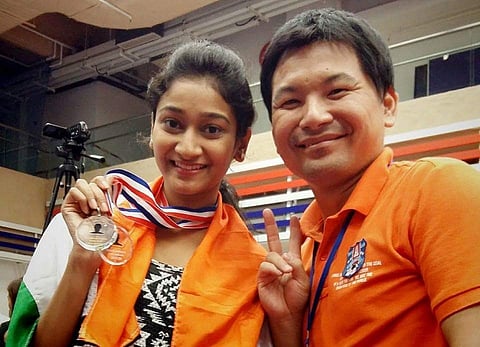

HYDERABAD: When someone faces challenges head-on and achieves great things, they must be commended. Sri Vyshnavi Yarlagadda, an international grandmaster of memory, and Dr Shaik Husna Sameera, an international carrom player and a Guinness World Records holder, are all about persistence, passion and self-belief.
Ahead of the International Day of the Girl Child on October 11, CE speaks to these two remarkable sportswomen about their journeys.
‘Girls, take charge of your lives’
“My journey is a small reminder of what is possible when girls are empowered. I believe that with more emphasis on quality education, self-confidence, and the right mentorship, every girl can overcome limitations and create her path,” Vyshnavi says, adding that girls should take charge of their own lives.
Vyshnavi has been representing India in memory sports since 2010 and was the first Indian to win an open gold at the World Memory Championships. Having set four world records, she has become a well-known figure in her sport. However, her journey to becoming a memory athlete was far from straightforward.
Vyshnavi recalls her childhood when she struggled with regular schooling. “I hated going to school. Every time I went, I would get sick and cry for weeks,” she says. Her mother, recognising her discomfort, enrolled her in various activities to keep her engaged. Vyshnavi explored everything from classical dance to chess, which led her to discover memory techniques.
What started as a strategy to improve in chess quickly turned into a full-blown passion for memory sports. After a few weeks of preparation, she participated in her first national memory competition in 2010 and came sixth. It was then that Vyshnavi realised this was something she wanted to pursue further.
She worked tirelessly, learning through trial and error, and gradually refined her techniques.
“When I first won the gold at the World Memory Championships, I was just 15 or 16. That was a huge boost for me. I was so excited,” she recalls. But it wasn’t just about the victory for Vyshnavi. As a young girl competing internationally, she was driven by her love for the sport and the personal growth it offered her.
Now, balancing coaching and entrepreneurship alongside memory sports, Vyshnavi is eager to continue competing. She also emphasises the importance of her support system, particularly her mother, who has stood by her side throughout her journey. The champion says, “Even after so many years of competing, after all the medals and world records, my mom still asks, ‘Do you want some water? Do you want something to eat?’ It keeps me grounded and takes the pressure off.”
‘I realised I wanted to win’
Dr Shaik Husna Sameera’s journey into carrom started with a completely different ambition.
“I always wanted to be a dancer. I got selected for a dance reality show when I was nine,” she states. But fate had other plans.
On the day of Sameera’s first national carrom tournament in Varanasi, which coincidentally happened to be her birthday, her parents decided that she would compete in this tournament rather than pursue dance.
“At first, I wasn’t happy about it. I was upset because I wanted to dance. But once I started playing that day, something inside me shifted. I realised I wanted to win,” Sameera says.
She went on to win her first round in straight sets despite having no professional coaching or significant practice. Her parents recognised her potential, and from there, Sameera’s journey as a professional carrom player began.
Over the years, Sameera has faced her fair share of challenges, from balancing her education to grappling with the demanding nature of competitive sports. But it was her determination and drive that helped her. Today, Sameera is not only a carrom player but also has a doctorate in sports, proving that she can balance her passion with grace.
In our society, people still want girls to get married as soon as they reach a certain age. Even if girls want to do something, there are a lot of restrictions, “I feel girls should do something on their own, as it will not only make them independent but will also make them confident,” says Sameera.
With their hard work, dedication, resilience, and willingness to push boundaries, Vyshnavi and Sameera inspire girls across the world. Their stories act as timely reminders of the importance of giving girls the chance to grow as individuals and the means to pursue their aspirations.
Indeed, girls can achieve remarkable success in sports, academics, or the arts, shattering stereotypes and breaking barriers.